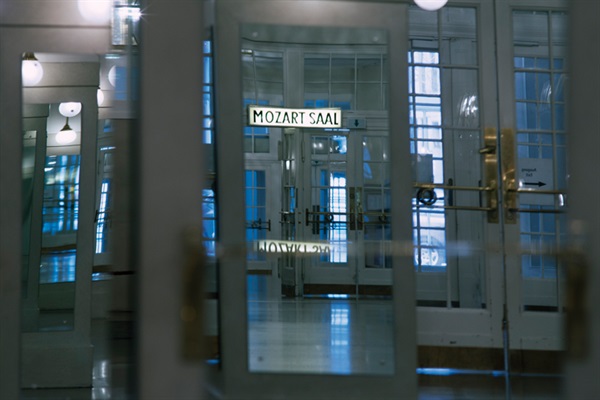
Großes Foyer © Lukas Beck
Concert etiquette
»The righteous need no laws, the wise no counsel« (Vincentia Juan de Latinos, 1653) – Faithful to these precepts, the concertgoer needs no rules of etiquette beyond the good manners and thought for others expected of one in daily life.
But a guide to some Konzerthaus, situation-specific aspects of etiquette might be helpful and serve as counsel.
Neither Turtle Necked nor Butterfly?
Dress for a performance? In general, the answer is »yes, please«! While Wiener Konzerthaus applies no dress code, it may be remarked that thorough enjoyment of a performance is also heightened by the guests' advance preparation — dressing for the occasion. If dress matches the concert – be it classic, jazz, or experimental – it heightens the experience for the other guests.
The Late Comer
»Late you come, but come ye do ... yet distance come excuse your tardiness« (freely after Friedrich Schiller, 1799, Wallenstein-Triology).
But excused, the guest will still be required by the attendants to wait »outside«, before they are admitted to the performance, thereby minimizing the disturbance for the audience. Even two-minutes late might cost a major part of a performance – yet we are sure that even a guest who has always been early and is delayed »just this once« will show understanding for this house rule.
Of noises off and on
The disadvantage of an acoustically exemplary hall is that all sounds, both those emanating from the podium and those gratuitously offered by the audience, are heard with clarity throughout the hall! Hence:
Noises, electronic
The interpretation of a masterpiece is rarely enhanced by ring-tones – be they classical, modern, experimental or even »pings«. Cell phones, pagers and watches of any variety or complexity must be either switched off, or have noisesome call, message, alarm and reminder functions deactivated. Should it nevertheless happen that a guest has overlooked one of his or her electronic »aides«, the device should immediately be throttled, without any attempt to respond or to leave the performance – thus limiting the damage done.
Noises, biomechanical
The heroic fight to control the tickle in the throat, the nasal itch …: coughs and sneezes cannot always be controlled and the resulting biomechanical noises may be unavoidable. The excellent acoustics, far, far less muffled than in the typical theatre or cinema auditorium ensure that the suffering guest becomes an unwilling centre of at- or distraction.
Facing such adversity, the only recourse is to »mute« the sound, as does the French or Viennese hornist. An interspersed handkerchief, sleeve or shawl will serve to soften the volume and complex structure of the sound – thereby softening the disturbance to the other concert goers.
There is, too, the related and well-known need of many concert goers to cough or clear their throats during the pauses between the movements of the symphony or other piece being performed. While some guests may even consider this ritual an essential part of the musical experience, it is a major irritant for those performing, as well as for members of the audience.
If such biomechanical »outings« are unavoidable, apart from muting, it is also recommended that they be held back to the forte and fortissimo moments in a performance: clearing one's throat will then at most disturb the neighbour, but not the whole hall.
PS: It is a fact of life that, cough sweets decline to be silent when unwrapped and make themselves heard in the noisiest of concerts.
Expressions of approbation
Spontaneous exhibitions of an audience's feelings after a performance belong to the most emotional moments of a concert visit, and must be allowed free rein. The Romans, true experts, characterized countless forms of applause, of which but a few are still in use. Among them are, however, two which are experienced as distressing by performers and audience alike:
1. Applausus interrumpens: The interjection of applause into the pauses between movements of a multi-part composition or after each piece in, for example, a lieder recital demonstrates enthusiasm and good physical condition, but fragments the performance and the atmosphere;
2. Applausus praecox: Someone who starts to clap before the last note of a piece has died away does truly exhibit knowledge of the work and a good reaction time, but shows little sensibility for the essential moment of quiet that an audience needs to fully experience the composer's message.
To avoid embarrassment, at the final tone, take a deep breath, absorb the atmosphere of the moment, perhaps even count slowly to three – and your emotions will find their own, appropriate release.